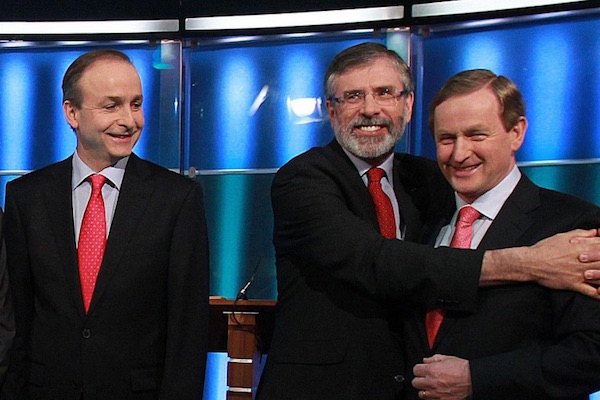
By Jim Gibney (for Irish News)
It was shortly after 10pm when the polls closed last Friday in the south’s general election that I received a text message from Gerry Adams, in response to a text I sent him wishing him good luck: “Well, we have 2 in Louth. And we will do well nearly everywhere”, he said.
I was instantly gripped with excitement and anxiety at such a confident prediction from such a cautious person on such occasions.
I thought were it to come true what a personal tribute for Gerry and what a slap on the face for the naysayers in the political establishment and media who try to denigrate him and thereby the tens of thousands of people who vote Sinn Fein.
I looked at my brother Damien. We were at his daughter Sinead’s 30th birthday party. He is a former Sinn Fein councillor in Lisburn. He is in regular pain from a serious neck injury he received when a mob of loyalists attacked him and his colleague, Pat Rice, as they attended a council meeting representing their constituents. Back then loyalists were killing Sinn Fein councillors and their families.
In an interview standing alongside Imelda Munster, who was elected with him, Gerry Adams said the people of West Belfast elected him and so had the people of Louth. And I thought - and they did it with such style: spectacularly and proudly.
I first met Gerry Adams in the autumn of 1977 at a meeting about political prisoners in the Ballymurphy Tenants Association. A man of the highest integrity, he sat in a crowded room of relatives, mainly women - all working-class, unassuming, listening, quietly advising.
A sage for all seasons and situations. He now shapes this nation’s politics for people just like those we met in Ballymurphy.
On polling day last Friday I was in the Felon’s Club in West Belfast in the company of over 200 relatives of IRA volunteers who died fighting the British Crown forces. They were going to Dublin to an event to mark the 1916 Rising to honour those who died one hundred years ago, just like their sons and daughters, in the noble cause of Irish independence.
People were keen to talk about Sinn Fein’s prospects at the polls. The nation’s capital would be voting while it played host to a group of very proud people.
As the votes were being counted a key Sinn Fein objective was emerging in the next Dail: the realignment of politics on a left/right axis and a growing Sinn Fein presence led by Gerry Adams.
As this unfolded I passed through Gerry Adams’ former constituency, now in the hands of the irrepressible MP Paul Maskey, an area with one of the largest number of Sinn Fein voters in Ireland.
It is home to many republican martyrs some whose lives touched me: Bobby Sands MP for Fermanagh/ South Tyrone, Kieran Doherty TD for Cavan/Monaghan, Joe McDonnell, Brendan O’Callaghan, an IRA volunteer shot dead by the British Army, Miriam Daly, my mentor, shot in her home by loyalists.
Miriam often spoke about her father’s association with Michael Collins during the War of Independence. With her I met Nora Connolly O’Brien, James Connolly’s daughter and Maire Comerford. From Miriam I learned so much about the importance of the politics of the nation and how close we are through others to iconic figures from the past.
I thought of Sarah Holland from the Glen Road, Belfast. Now a Sinn Fein councillor and mayor of south Dublin she stood unsuccessfully for the party in the southern election. For decades the Holland family have provided distinguished political and civic leadership to the republican cause.
James Connolly wrote that partition would cause a ‘carnival of reaction’. It did that and more. The two states isolated republicans, and apartheid, unionist-style, excluded nationalists from power in the north while the southern state abandoned them.
With Martin McGuinness as deputy first minister in the north that exclusion has ended. With Gerry Adams leading a significantly larger group of Sinn Fein TDs in the Dail the north will, in this centenary year of the 1916 Rising, never again be abandoned.
![[Irish Republican News]](https://republican-news.org/graphics/title_gifs/rn.gif)
![[Irish Republican News]](https://republican-news.org/graphics/title_gifs/harp.gif)

